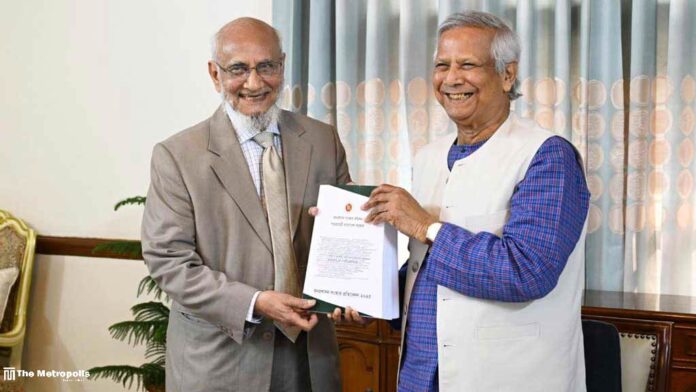Two additional commissions established as part of the state reform initiative have submitted their reports to Chief Advisor Muhammad Yunus.
The Judiciary Reform Commission, headed by Chief Justice Shah Abu Naeem Mominur Rahman, and the Public Administration Reform Commission, led by Abdul Muyeed Chowdhury, presented their reports to Yunus at the State Guest House Jamuna on Wednesday.
Yunus expressed that the reports and their recommendations were significant not only for Bangladesh but for every nation globally.
He remarked, “This is excellent news for the nation. On behalf of the people, I extend my gratitude to the chairmen and members of the commission.”
Emphasizing the direct impact of these proposals on every citizen, Yunus stated, “These two reform commissions are such that every Bangladeshi citizen is affected by them. Other commissions address various issues, but they do not have the same direct impact. Whether you’re poor, rich, or middle class, you must interact with these two sectors.”
On January 15, reports from the Constitution, Election System, Police, and Anti-Corruption Commission reform commissions were handed over to the chief advisor.
So far, six commissions have submitted their reports.
The interim government initially formed six commissions to reform various state sectors, marking the first step toward the country’s democratic transition after the fall of the Awami League government on August 5, 2024.
In November, five additional commissions were formed, with their reports expected by February.
Once all reports are received, the National Consensus Commission, led by the chief advisor, will make the final decisions on the proposed actions.
At a press briefing on Tuesday at Dhaka’s Foreign Service Academy, Law Advisor Asif Nazrul mentioned that the complete report of the six reform commissions will be released on February 8. The full report and recommendations will be shared with political parties and groups supporting the mass uprising.
Nazrul expressed optimism that the first formal meeting of the National Consensus Commission would take place in mid-February, following consultations with political parties and stakeholders who supported the July uprising. The meeting’s date will be finalized through discussions with the parties.
The meeting will be presided over by Chief Advisor Yunus and will include political parties, pro-movement forces, and the heads of the six reform commissions.
Nazrul added, “The dialogue will begin in mid-February and continue through Ramadan, if the political parties agree. The meeting will focus on finalizing what can be done to implement reforms as quickly as possible.”
In response to a question, the law advisor confirmed that the work of the six commissions will conclude with the release of the full report on February 8, marking the start of the National Consensus Commission’s work.



